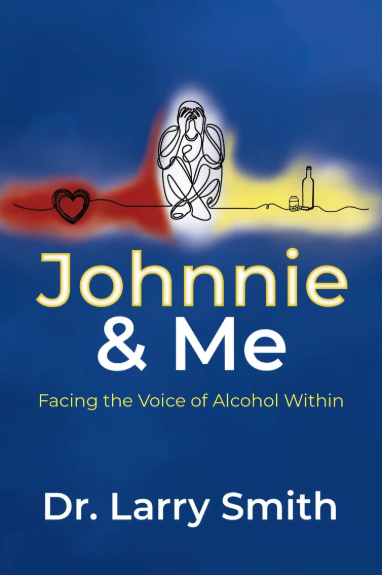
In this post, we delve into the crucial elements of maintaining long-term sobriety, inspired by the remarkable journey of Dr. Larry Smith. Since 1999, Dr. Smith has successfully navigated the challenges of recovery by implementing a comprehensive daily plan. This plan includes journaling for self-reflection, meditation for inner peace, healthy meals for physical well-being, regular exercise for stress reduction, meaningful connections for support, and honest feedback for accountability. We'll explore each of these components in detail, providing practical insights and actionable steps to help you create your own personalized roadmap for sustainable recovery. This article expands on the insightful conversation I had with Dr. Smith in the recent episode of my podcast, Recovery, Truth, and Hope with Dr. Larry Smith, where he shared his experiences and strategies for overcoming addiction. You can also find the episode show notes here.
The Importance of a Daily Sobriety Plan
Maintaining sobriety is a continuous journey, not a one-time achievement. A daily plan provides structure, accountability, and a sense of purpose, helping individuals navigate the challenges and temptations that can arise during recovery. Without a plan, it's easy to slip back into old patterns and behaviors. A well-defined plan acts as a compass, guiding you towards your goals and keeping you on track. It's about consciously choosing sobriety each day, reinforcing your commitment, and building a life grounded in health and well-being.
Meet Dr. Larry Smith: A Story of Recovery and Hope
Dr. Larry Smith is a Canadian chiropractor, author, and recovery advocate who has been sober since September 22, 1999. His journey is one of resilience, honesty, and profound self-discovery. Dr. Smith openly shares his struggles with addiction, the challenges he faced, and the strategies he developed to maintain sobriety. His story is a beacon of hope for anyone grappling with addiction, demonstrating that long-term recovery is possible with the right tools and support. Dr. Smith's books, including "Johnnie and Me: Facing the Voice of Alcohol Within" and "Embracing the Journey of Recovery," offer valuable insights and guidance for those seeking a path to lasting sobriety.
The 'Johnnie' Metaphor: Personifying Addiction
In his memoir, "Johnnie and Me," Dr. Smith introduces the concept of personifying addiction as "Johnnie," the voice of alcohol within. This powerful metaphor allows individuals to externalize their addiction, separating it from their true selves. By giving addiction a name and a distinct identity, it becomes easier to recognize its manipulative tactics and resist its influence. "Johnnie" represents the cravings, rationalizations, and negative self-talk that can sabotage recovery efforts. By understanding "Johnnie's" strategies, individuals can develop effective counter-strategies to maintain their sobriety. This approach provides a unique perspective on addiction, making it more tangible and manageable.
Dr. Smith's Daily Plan for Sobriety: A Step-by-Step Guide
Dr. Smith's daily plan is a holistic approach to recovery, encompassing mental, physical, and emotional well-being. It's a comprehensive strategy designed to address the underlying causes of addiction and promote lasting sobriety. The plan consists of six key elements: journaling, meditation, healthy meals, exercise, connection, and honest feedback. Each element plays a crucial role in maintaining balance, reducing stress, and reinforcing the commitment to recovery. This plan is not a rigid prescription but rather a flexible framework that can be adapted to individual needs and preferences.
Journaling: Reflecting on the Journey
Journaling is a powerful tool for self-reflection and emotional processing. By writing down your thoughts, feelings, and experiences, you gain a deeper understanding of yourself and your addiction. Journaling can help you identify triggers, track progress, and process difficult emotions. It's a safe space to explore your inner world without judgment or criticism. Regular journaling can improve self-awareness, reduce stress, and enhance emotional regulation. It's an opportunity to learn from your past, appreciate your present, and plan for your future. Use journaling prompts to guide your writing.
Meditation: Finding Inner Peace
Meditation is the practice of training your mind to focus and quiet the internal chatter. It's a powerful tool for reducing stress, improving focus, and cultivating inner peace. Regular meditation can help you become more aware of your thoughts and emotions, allowing you to respond to them with greater clarity and composure. Meditation can also enhance self-compassion, reduce anxiety, and promote overall well-being. There are many different types of meditation, so experiment to find one that resonates with you. Guided meditations can be particularly helpful for beginners. Even a few minutes of daily meditation can make a significant difference in your recovery journey.
Healthy Meals: Nourishing the Body and Mind
Nutrition plays a vital role in recovery. A healthy diet provides the essential nutrients your body and mind need to function optimally. Processed foods, sugary drinks, and unhealthy fats can exacerbate cravings, mood swings, and other symptoms of addiction. Focus on eating whole, unprocessed foods, including fruits, vegetables, lean proteins, and whole grains. Pay attention to your body's needs and eat regular meals to maintain stable blood sugar levels. Cooking healthy meals can also be a therapeutic activity, providing a sense of accomplishment and control. Nourishing your body is an act of self-care that supports your overall recovery.
Exercise: Releasing Endorphins and Reducing Stress
Exercise is a powerful tool for reducing stress, improving mood, and boosting overall well-being. Physical activity releases endorphins, which have mood-boosting effects. Exercise can also help you manage cravings, improve sleep, and increase energy levels. Find an activity you enjoy, whether it's walking, running, swimming, dancing, or yoga. Aim for at least 30 minutes of moderate-intensity exercise most days of the week. Exercise is not just about physical health; it's also about mental and emotional well-being. It's an opportunity to connect with your body, release tension, and cultivate a sense of accomplishment.
Connection: The Power of Community and Support
Loneliness and isolation can be significant triggers for relapse. Connecting with others who understand your struggles can provide invaluable support, encouragement, and accountability. Build a strong support network of friends, family members, or fellow recovery members. Attend meetings, participate in group activities, or volunteer in your community. Sharing your experiences and listening to others can reduce feelings of shame and isolation. Remember, you are not alone. Connecting with others can provide a sense of belonging and purpose, strengthening your commitment to recovery.
Honest Feedback: Staying Accountable
Honest feedback is essential for staying accountable and making progress in recovery. Seek out trusted friends, family members, or mentors who can provide constructive criticism and support. Be open to hearing their perspectives, even if it's difficult. Honest feedback can help you identify blind spots, challenge negative patterns, and stay on track. It's a sign of strength to ask for help and be willing to learn from others. Regular check-ins with your support network can provide ongoing accountability and encouragement.
The Role of Meetings and Community in Recovery
Meetings, whether they are 12-step meetings or other support groups, offer a safe and supportive environment to share experiences, learn from others, and build connections. While the frequency of attendance may vary over time, the importance of community remains constant. Meetings provide a sense of belonging and understanding, reducing feelings of isolation and shame. They offer practical advice, coping strategies, and encouragement from people who have been through similar experiences. Whether you attend meetings regularly or occasionally, the power of community can significantly enhance your recovery journey.
Faith, Surrender, and Letting Go
Faith, surrender, and letting go are essential elements of long-term recovery. Faith is the belief in something greater than yourself, whether it's a higher power, a supportive community, or your own inner strength. Surrender is the willingness to let go of control and accept the things you cannot change. Letting go is releasing attachment to specific outcomes and trusting that everything will work out in the end. These principles can help you navigate the ups and downs of recovery with greater resilience and acceptance. They encourage you to focus on the present moment, trust the process, and have faith in your ability to overcome challenges. As Dr. Smith mentions in the episode, faith doesn't have to be religious. It can be in yourself, or your support network.
Writing as a Form of Healing
Writing can be a powerful form of healing, allowing you to process trauma, express emotions, and gain clarity. Dr. Smith's journey from hiding his struggles to embracing radical honesty through writing is an inspiring example of the transformative power of storytelling. Writing can help you make sense of your experiences, challenge negative beliefs, and cultivate self-compassion. It's an opportunity to explore your inner world, connect with your authentic self, and share your story with others. Whether you write in a journal, create poetry, or write a memoir, the act of writing can be deeply therapeutic and empowering.
Preview of Dr. Smith's Upcoming Novel: '2084: The Neuroxone Conspiracy'
Dr. Smith's upcoming novel, "2084: The Neuroxone Conspiracy," is a dystopian medical thriller that explores themes of addiction, industry, and choice. The novel delves into the complexities of the pharmaceutical industry, mandated treatments, and the fight for personal freedom. It's a thought-provoking and timely story that raises important questions about the role of addiction in society and the power of individual agency. Keep an eye out for its release and prepare to be captivated by its compelling narrative and insightful commentary.
Resources Mentioned in the Episode
During the podcast episode, we discussed several resources that can support your recovery journey. These include:
- Books by Dr. Larry Smith: "Johnnie and Me: Facing the Voice of Alcohol Within" and "Embracing the Journey of Recovery" offer valuable insights and guidance for those seeking lasting sobriety.
- Dr. Larry Smith's Website: Visit drlarrysmithauthor.com for more information about Dr. Smith's work and to purchase signed copies of his books.
- 12-Step & Recovery References: AA/NA and Cochrane Collaboration meta-evidence can provide support and guidance for those seeking recovery.
- Meditation Reference: Wayne Dyer's "Getting in the Gap" offers valuable insights into the practice of meditation.
Embracing Long-Term Recovery with a Daily Plan
Long-term recovery is a journey, not a destination. It requires ongoing effort, commitment, and self-compassion. By implementing a daily plan that encompasses journaling, meditation, healthy meals, exercise, connection, and honest feedback, you can create a solid foundation for sustainable sobriety. Remember to be patient with yourself, celebrate your progress, and seek support when you need it. Dr. Smith's story is a testament to the power of resilience and the possibility of lasting recovery. Embrace your journey, stay committed to your plan, and believe in your ability to create a fulfilling and sober life.
I hope this blog post has provided you with valuable insights and practical tools to support your recovery journey. Remember to check out the full conversation with Dr. Larry Smith on the Conversations with Rich Bennett podcast for even more inspiration and guidance. Thank you for reading, and I wish you all the best on your path to long-term sobriety.










